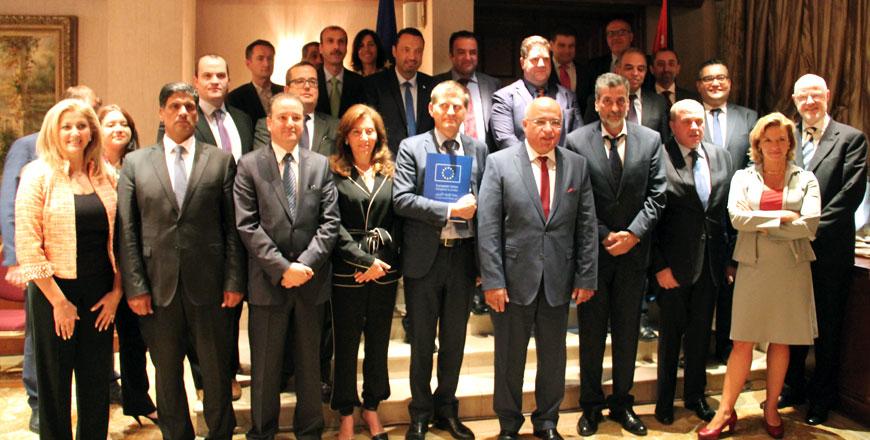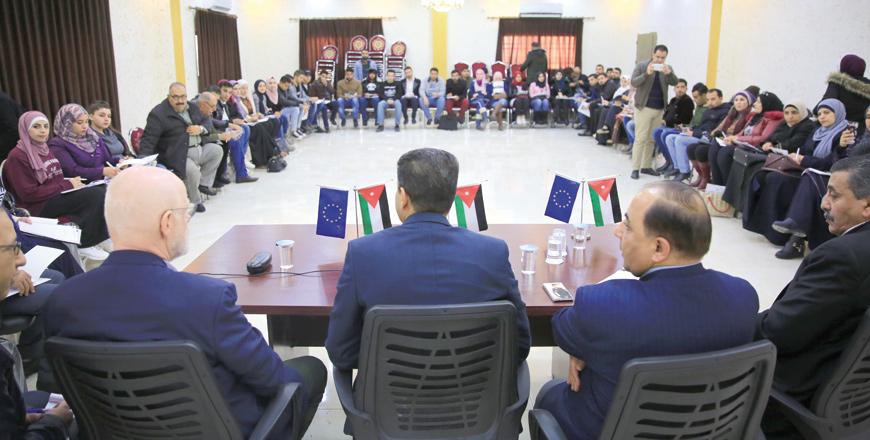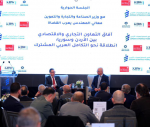You are here
Jordan has made concrete steps towards consolidating democracy — stakeholders
By Camille Dupire - Nov 05,2018 - Last updated at Nov 07,2018

Representatives of Jordan's main political entities and of EU-JDID discuss the programme's achievements at the King Hussein Club, on Monday (Photo courtesy of EU-JDID)
AMMAN — Representatives of Jordan's main political entities and of the governmental project “Enhanced Support to Democratic Governance in Jordan” (EU-JDID) on Monday convened in Amman, where they held the second coordinative meeting of EU-JDID
The meeting was co-chaired by acting secretary general of the Independent Election Commission (IEC), Tareq Bataineh, and EU Ambassador to Jordan Andrea Matteo Fontana.
Launched in May 2017 to “support Jordan’s reform process towards the consolidation of democracy and to promote inclusiveness of national policy and decision making”, the 17.7 million-euro programme is funded by the EU and the government of Spain, and implemented by a consortium led by the European Centre for Electoral Support (ECES) and the Spanish Agency for International Development, according to a statement by the organisers.
"The programme is delivering important activities from leadership training to legislative drafting and other important capacity-building elements. Parliament, the IEC, the political party system and the civil society benefit greatly from the results that have been achieved so far," Fontana said in his opening remarks, noting that "soon, we will also see the voting system installed for Parliament, which will ensure the transparency of voting as much as the effectiveness of parliamentary processes".
"After 18 months of the project’s implementation, we are particularly proud — yet not complacent — of the work that has been achieved until now," ECES President Monica Frassoni agreed, referring to "the environmental paperless policy within the House of Representatives [HoR]. The technical, operational and legal support for the recent re-election organised in the Central Badia region”, and the "enhancement of institutional and human resource capacity of the IEC through innovative training programmes”.
Commenting on the HoR’s reforms, First Deputy of the Speaker of the HoR, Nassar Al Qaisi, highlighted that “ideas became more realistic and concrete after the first coordinative meeting, which planned aspects of the cooperation between the programme and the HoR".
Citing the start of the installation of the e-voting, audio and videoconferencing system, he noted that "the training courses and exchange visits have contributed to the HoR’s awareness of different democratic experiences”.
"It is not just what we do, but how we do it that matters," Frassoni insisted, stressing the importance of "engaging in long-term dialogue and support regarding democracy on the basis of strong relevant national stakeholders as a key aspect of EU-JDID. These are the means to ensure the needed flexibility to respond to the real needs and national priorities as illustrated by His Majesty King Abdullah's speeches".
Based on four main components, the four-year programme focuses on Parliamentary support, electoral assistance, support for the political parties system and support to civil society organisations (CSOs), according to the programme's chief technical adviser, Aous Qutaishat.
Discussing the role of civil society in the reform process, Ambassador of Spain to Jordan Aránzazu Bañón Dávalos said: "An independent civil society promotes accountability and enhances the legitimacy of the public sector. Civil society and government are essential to one another, and to the success of democracy."
"We want to encourage the dialogue between institutions and civil society to carry out ambitious and necessary reforms. EU-JDID reinforces Spanish commitment for Jordanian reforms towards a more inclusive democracy through the role of CSOs. Even more so, all democratic institutions a part of EU-JDID, also have an important role to promote and facilitate an enabling environment for civil society,” he continued.
Bataineh expressed the IEC's gratitude for the constant support from the EU, both logistical and operational, highlighting that "through the capacity building activities, the IEC will be the first election management body to receive the accredited ISO certification in the MENA region".
Acting Secretary General of MoPPA, Ali Khawaldeh, stated that the ministry seeks to advance the role of political parties through increasing its effectiveness and political participation, in addition to enhancing the role of women in political participation and increasing their enrollment in political parties.
He also stressed on supporting partner institutions and relevant national actors in consolidating democracy and promoting the inclusiveness of the national policies and decision-making processes.
Monday's meeting took place following two steering committees held with beneficiary institutions in September and October of this year, which aimed to reaffirm "the comprehensive and cohesive approach to achieve shared goals and objectives by all relevant stakeholders", in addition to agreeing upon the work plans for the years 2018 — 2019, according to a statement by the organisers.
Related Articles
AMMAN — On Tuesday, the Centre for Strategic Studies of the University of Jordan hosted a conference to present the main findings of a civil
AMMAN — Representatives of the project “Enhanced Support to Democratic Governance in Jordan” (EU JDID), funded by the EU and the Kingdom of
AMMAN — Fifty young Jordanians, aged 16-25, attended the “Youth and Political Participation in Jerash Governorate” workshop, organised by th

















